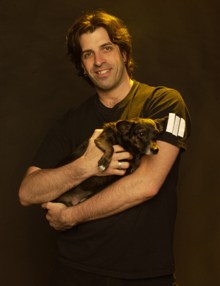
A week ago today, TKO [The Kirby Organization] founder and Chairman Dave Kirby lost his battle with prostate cancer. Dave was diagnosed with terminal prostate cancer in 2009 and, at that time, made the decision that he was going to devote the final months of his life to his wife and two teenage sons. Nobody outside his inner-most circle knew of his condition until he passed away Saturday in his Manhattan Beach home.
I first met Dave Kirby in New York in the mid-‘90s. I was Executive Editor of a rock magazine, and he was the agent for seemingly every band I covered. It was over our early and mutual belief in bands like Sevendust, Slipknot, Disturbed and Evanescence – bands whose careers he was instrumental in breaking – that we bonded over drinks at shows, standing in the back of venues like Roseland Ballroom, Coney Island High and Irving Plaza, comparing thoughts on the direction that heavy music was heading.
Dave viewed the road as not only the ultimate marketing tool, but also a key cog in the artist development wheel, and he was constantly applying that mindset to the bands on his roster, which now include Buckcherry, Anthrax, The Cult, Drowning Pool, Kittie, Hank III, Mudvayne and Motorhead. Over the years, I worked with him in several different capacities, from handling content for his website and press for his company, to even managing an act on his roster. Regardless of the project, Dave always had a vision.
Whether he was orchestrating packages for his largest clients, or plotting a road plan for an emerging artist, a meeting with Dave was like being in the midst of a chess game. It was actually an ongoing joke - if we had an 11am meeting, I could count on it being delayed until at least after lunch. Then I could expect to watch two CNN news cycles in his office while he seemed to take care of everything but our scheduled appointment.
If anyone else did that it would piss me off, but not Dave. The longer I'd sit in his office, the more I would learn - his people skills were epic. He could push buttons, then diffuse them a moment later. If it seemed like Dave was more interested in comparing Canadian and American politics, that's only because he was already two steps ahead of the meeting he was entertaining. And when there was a problem? Dave could mediate like no other.
As anyone that worked closely with Dave will attest, his greatest attribute was his loyalty. Once you earned Dave’s respect, you had it forever. And he always had your back. Was he outspoken? Of course he was. But like most successful businessmen, that became part of his charm. Dave Kirby defied the rules, abided by his instincts, and was beholden to nothing more than his gut.
And isn’t that what great music is all about? Great music, and great music executives. With the exception of maybe Sharon Osbourne, Dave did more for hard rock and heavy metal in the past fifteen years than anyone I can recall. And even OZZfest has Dave to thank - in 2001 alone, he represented eleven bands on the tour.
When I argued that we shouldn’t try and keep his cancer under wraps, suggesting that we should go public before rumors start to take on a life of their own, he just shook his head and said not to worry… And in typical Dave Kirby fashion, everything worked out. No, not for the best – we lost a great man to a crippling disease. But Dave Kirby had a plan, and he never strayed from it.
He died in his own bed, in the arms of his wife and the glow of his sons. He went out with dignity and pride, and he didn’t stress his friends and colleagues over worrying about how to act or how to feel. He didn’t want anyone to feel sorry for him, he just wanted to cherish the time he had left with the people he loved most.
He left this life like he lived life – on his own terms. And in the end, just like the careers of the countless bands he launched, his plan was an unmitigated success. Right down to putting a team in place that he knew would not only carry TKO into the future, but also further his legacy of developing artists on the road and in front of fans, where their music means the most.
Dave believed that a major problem with today’s music industry is that too many people can’t see the proverbial forest through the trees. He knew that to have a forest, first you needed to grow the trees – and the stronger the trees, the stronger the forest.
If everyone in this business worried as much as Dave did about growing strong trees, I can only imagine how much stronger this industry would be…
Rest in peace, Dave, you’ve earned it!
.jpg)




No comments:
Post a Comment